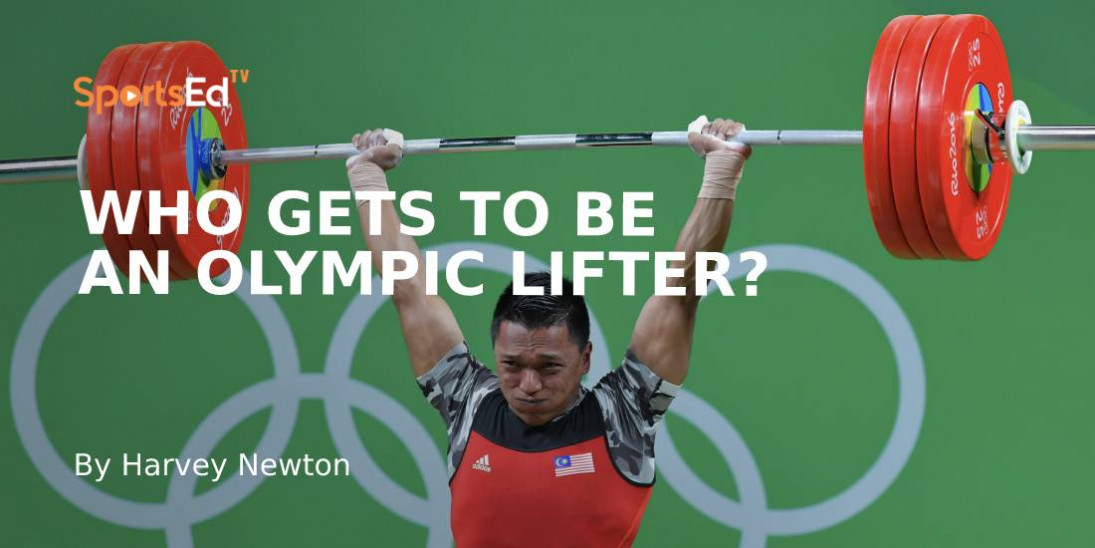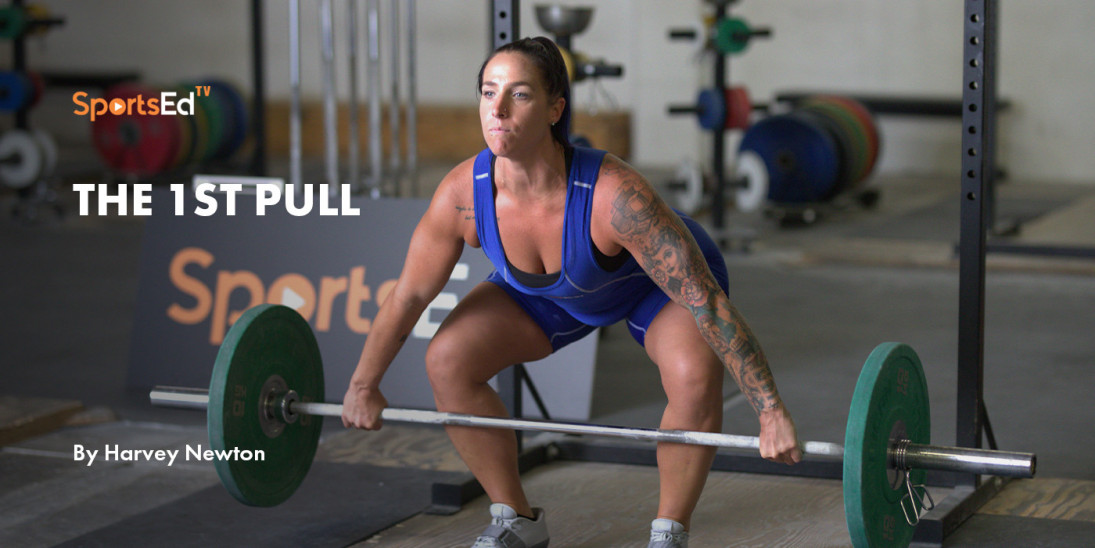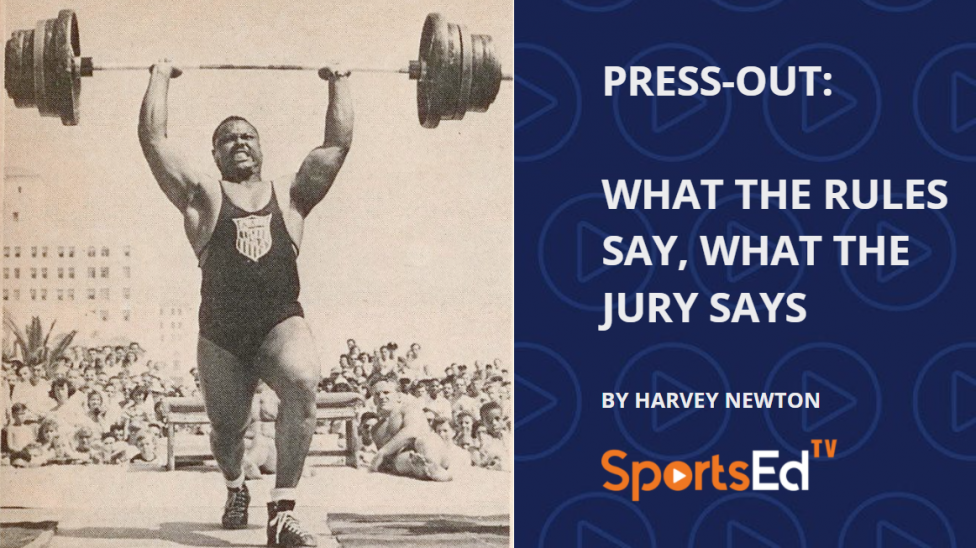Weightlifting
Welcome and thanks for visiting...

So, You Think You’re an “Olympic” Weightlifter?

Here are some interesting insights into the proper use of terminology and how very few of us truly qualify as Olympic weightlifters.
A few days after my recent return from Stamford, Connecticut where I worked with the NBC Sports broadcast team covering weightlifting in Tokyo, I had breakfast with a long-ago high school friend. The event, held nearby, was a fund raiser for our former school’s band. He and his wife traveled over from the Orlando area and we met up, enjoyed some pancakes in an outdoor seating area, and caught up.
My friend, a lead attorney in a Central Florida law firm, wanted to know about my experiences with NBC Sports, so I quickly brought the couple up to speed. At one point my friend asked, “Were you ever an Olympic weightlifter?” I smiled, put down the fork, and said, “Let me tell you the story.”
I proceeded to hold forth on the details of how and why this term “Olympic weightlifter” has been the ire of US Olympic Committee attorneys for many years. Certainly, this improperly used expression is fairly common. Aside from some potentially thorny legal issues, at least in the United States, any misplaced addition of the term “Olympic” to one’s background or product may cause some confusion.
This seemed like a good blog topic for SportsEdTV.
Background
It is difficult to determine when and how the term Olympic weightlifting came into vogue. Perhaps it was to differentiate between “lifting weights” (weight training) and a competitive sport. The term has been in use for many years by many who never get closer to the Olympics than reading about or viewing the competition from a distance.
While I had the honor of coaching the 1984 USA Olympic Weightlifting Team, that’s as close to the Olympics as I ever got.
But, as a young lifter I certainly referred to myself as an Olympic lifter, as this was the norm of the times in the United States and in most English-speaking countries. With respects to my English friends, I won’t use this forum to discuss whether the sport should be spelled as one word (International Weightlifting Federation) or as two (British Weight Lifting Association).
But no, I was never an Olympic weightlifter, an athlete competing at the highest level of sporting competition, the quadrennial Summer Olympic Games. As Michael H. Stone, PhD has repeatedly pointed out, for about two weeks every four years we do have a new class of Olympic weightlifters, but the title is not valid between Olympic Games.
As an aside, consider that the sport of powerlifting (actually a misnomer) has been with us for just over 50 years. As is often the case with sports or activities, powerlifting has previously sought inclusion in the Olympic Games. If such approval were ever given, what would we call this sport…. “Olympic Powerlifting?” Talk about confusion!
With the popularity of CrossFit, where weightlifting became a key component of the overall fitness philosophy, we soon saw variations on the theme, including “Oly.” As this term was reportedly pronounced by some newcomers as “Ollie,” it seems obvious that correct terminology was not likely to return any time soon.
It Started With “The Act”
As a result of the United States Congressional hearings that produced the 1978 Amateur Sports Act (now the Ted Stevens Olympic and Amateur Sports Act), I learned that in the United States the term Olympic is protected (copyrighted). Any group’s use of the term Olympic in this country before 1950 received “grandfather” status and could continue to use the term. This is how York Barbell’s old metal discs, with York Olympic Standard Barbell displayed, were not impacted.
The United States Olympic Committee (USOC) is quite strict on the enforcement of this term. Early on, they did agree to allow the Amateur Athletic Union (AAU), the organization that controlled many Olympic sports prior to “The Act,” the right to use the term AAU Junior Olympics. Similarly, the Special Olympics have been granted permission to use this word. Others, e.g., the Gay Olympics (now the Gay Games), have not been so fortunate.
In the 1980s I witnessed semi-truck loads of confiscated sports equipment being unloaded at the US Olympic ing Center. Items advertised, for example, as an Olympic E-Z curl bar or an Olympic bench were easy prey for USOC lawyers.
In the early 1970s, Bob Hise II, the Los Angeles-based coach originally selected to be the USA 1984 Olympic Weightlifting Team manager, published a periodical called International Olympic Lifter. During my time as USA Weightlifting’s executive director (and housed at the USOC headquarters) there was hardly a day go by when I did not hear from USOC staff about this “problem.” Bob stood his ground, and the publication continued under that title until its end in 1997.
We Are the Exception
Buy a ticket or check any program book at any Olympic Games and nowhere does any sport have Olympic as part of its name. It’s not Olympic diving, or Olympic gymnastics, or Olympic fencing. Fencing? That brings to mind a quick photo I took in Connecticut during the Tokyo Games. I got a chuckle out of this sign in the window of a local fencing center.

In recognition of a situation perhaps best described by the old expression, “Shoveling s#+% against the tide,” I have fought this battle for years. Articles I have authored on this subject appeared in the National Strength and Conditioning Association Journal (15,3) and on CoachesInfo.com (2008), a publication that evolved into the United Kingdom Strength and Conditioning Association’s Professional Journal.
In the early 1980s it seemed a corner had been turned, but progress in using proper terminology did not hold. Today we even have official weightlifting organizations that continue the improper use of the term, along with some of the sport’s leaders who came through the ranks during my era on the platform.
Sometimes the use of “Olympic-style” is used. I’m at a point where I tend to refer to the sport as “… the Olympic sport of weightlifting.” Of course, few join me in this regard, so I accept the fact that the misnomer Olympic weightlifting likely will continue.
Some years back, the sport of boxing started to refer to amateur boxing (three, 3-minute rounds) as “Olympic-style boxing” vs. a greater number of rounds typically found in professional boxing. That seems to make some sense. Through 2016 boxing at the Olympic Games was only open to amateurs, anyway. Of course, the original theme of the Olympics, competition among amateurs, has largely been replaced by “eligible.” Numerous Olympic sports allow professional athletes to compete.
The term “Olympic distance” is applied to the shorter version of the triathlon vs. greater distance events such as the Ironman. My last talk with the USOC legal team focused on taekwondo’s use of “Olympic-style” to differentiate from other forms, mostly in terms of punches thrown.
Can the Term Olympic Be Used?
Some legal opinions suggest that the USOC may be just a bit overzealous in their enforcement of the term Olympic. If there is money to be made, the USOC begins with a cease-and-desist letter, escalating upward from there. Check online where several legal authorities weigh-in on the subject of the use of protected, or copyrighted, words.
Meanwhile, remember that our sport is properly referred to as simply weightlifting. It’s the International Weightlifting Federation. The national governing body for the sport in this country is USA Weightlifting. Here’s an opportunity to further educate others.





